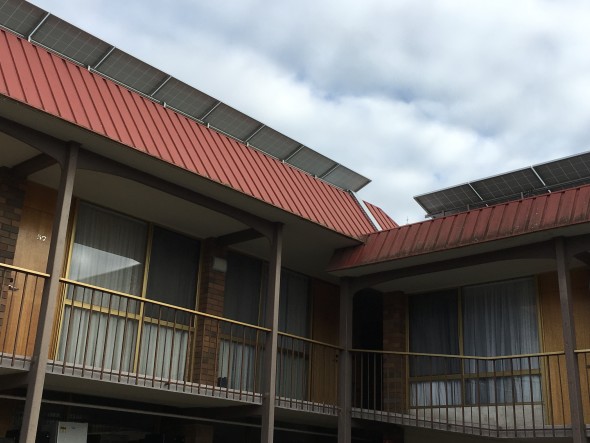
When you’re the owner of a 71-room short-stay hotel in regional Victoria, investing in rooftop solar doesn’t necessarily add up.
That’s because, during the daylight hours when the vast majority of customers are out and about, checking out the local tourist attractions or attending to business, the business’s energy load is at its lowest. Which means that without battery storage, most of the energy being generated by the rooftop solar system would be sent back to the grid for next to nothing.
And yet for the owner of Ballarat’s Mid City Motel – named for its location, in the middle of the Victorian regional city – the decision to install an 83kW rooftop solar system was one of the first to be made in the 18 months after buying it.
The decision, according to partner Kylie Finch, raised some eyebrows among friends and observers, considering the 1907s-era motel was in obvious need of refurbishment.
But as Mark Finch explained to One Step, the investment was not only about cutting electricity costs. In fact, his focus was on reducing one of the motel’s other major running costs – laundry.
“Most short-stay hotels don’t have much running costs during the day,” he said. “Our power usage during the sunlight hours is fairly minimal, so until the battery storage technology catches up, we need to use the (solar) power.”
To do this, he and his team have decided to build a commercial laundry on-site at the motel where, using state of the art washing and drying technology, they will launder all of the hotel’s sheets and towels during the day, using power from the sun.
“We’ve got a machine coming from Spain – a fully electric ironing machine. It takes a wet king-sized sheet, and turns it out the other end dry, ironed folded and stacked.”
Not only will this be a more efficient process for the motel – saving time by avoiding the need to send the dirty linen away to be laundered – but it will be vastly cheaper, with the potential, even, to generate extra income by washing the sheets and towels of other hotels nearby.
According to Finch, the solar powered laundry system will save the business around $10,000 a month which, as he puts it, is “a hell of a saving.”
But Finch also plans to invest in battery storage, eventually, once the prices and technology are right for him.
“Considering the cost of power,” he adds, “it’s getting more and more likely that it will be economically viable.”

Sophie is editor of One Step Off The Grid and deputy editor of its sister site, Renew Economy. Sophie has been writing about clean energy for more than a decade.


